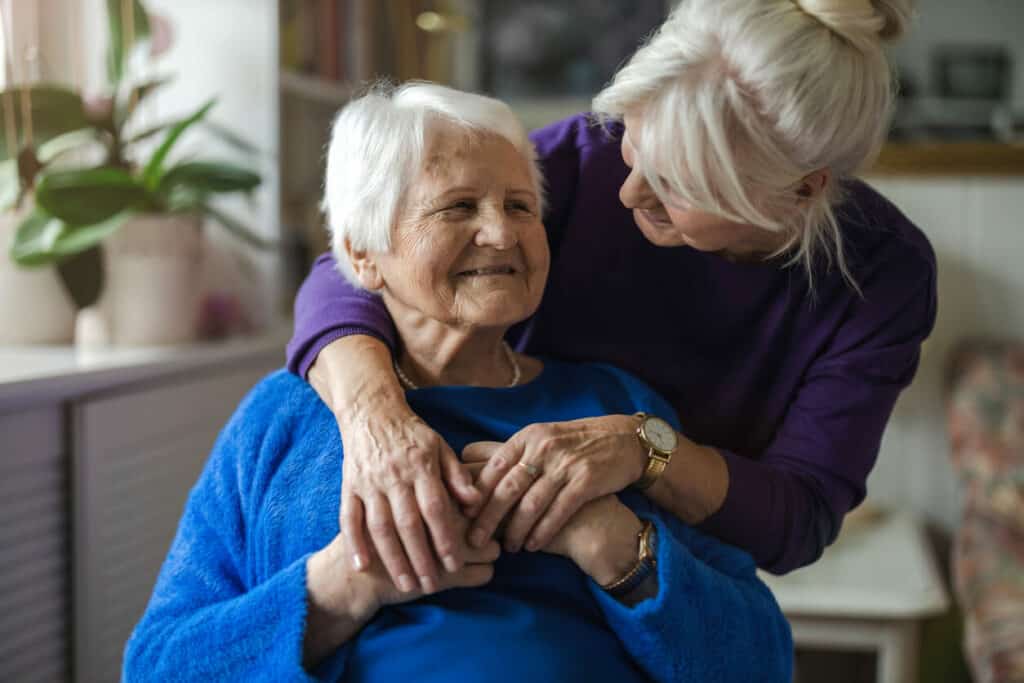
When a loved one begins to show early signs of dementia, there is great fear and concern for everyone involved. The thought that deterioration is occurring and that one day your loved one might not call your name or recognize your face can be heart-wrenching. It can be a difficult time for your loved one.
Understanding the signs and learning how to help someone with early dementia is crucial. At Amy’s Eden, we know that dementia caregiving requires patience and flexibility because it can be challenging.
In this blog post, we’ll show you practical dementia care tips and strategies to help your loved one maintain a better quality of life despite the condition.
What is Early Dementia?
People with dementia, such as Alzheimer’s and related diseases, have a progressive biological brain disorder. This disorder affects memory and various parts of the brain, making it challenging for them to remember things, think clearly, talk to others, and care for themselves.
There are many types of dementia, but Alzheimer’s disease accounts for about two-thirds of all cases.
Dementia progresses in three stages.
- Early Stage (mild)
- Middle Stage (moderate)
- Late Stage (severe)
Early-stage dementia or Alzheimer’s denotes the onset of the condition and can last for years. At this stage, symptoms are mild and are difficult to notice. Many people at this stage are independent but experience early signs of brain deterioration, like occasional forgetfulness.
Recognizing the Signs of Early Dementia
The signs of dementia are subtle in the early stage, making them challenging to detect. Signs of confusion and memory loss can be present, but they can also manifest subtle changes in behavior, like mood swings.
These can make the family members feel unsure and doubt whether they should seek professional help.
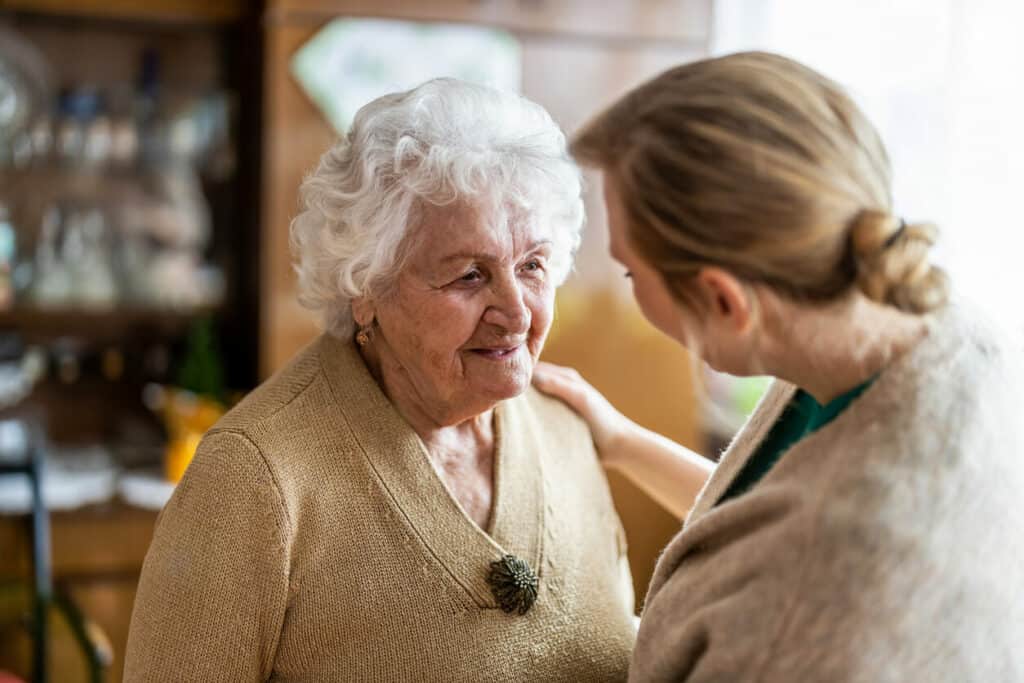
It’s crucial to understand and recognize the symptoms of early dementia for an immediate diagnosis. You can help your loved one get the support they need to manage the condition.
Here are some signs to watch out for:
Forgetfulness
This is the most common symptom of early dementia. Your loved one may experience memory problems and become forgetful.
- They may not recall events or keep losing items such as their keys, wallets, and glasses around the house.
- They may have poor orientation and not recognize familiar places or go to the bathroom only to forget why they went there.
- They may have difficulty finding the right words to express themselves or have trouble remembering names even though they were just introduced.
Difficulty reasoning or planning
You may notice your loved one’s inability to think things through or follow instructions. They may have trouble solving problems or making complex decisions — for instance, about their finances.
You may also notice number-related difficulties such as counting change or organizing bills to be paid — things they can normally do with ease.
Difficulty with daily tasks
Your loved one may struggle to complete simple everyday tasks and household chores. Tasks like setting the table properly or keeping the door unlocked.
Mood changes
You may notice your loved one feeling anxious or sad. They may become easily upset, irritable, or frustrated.
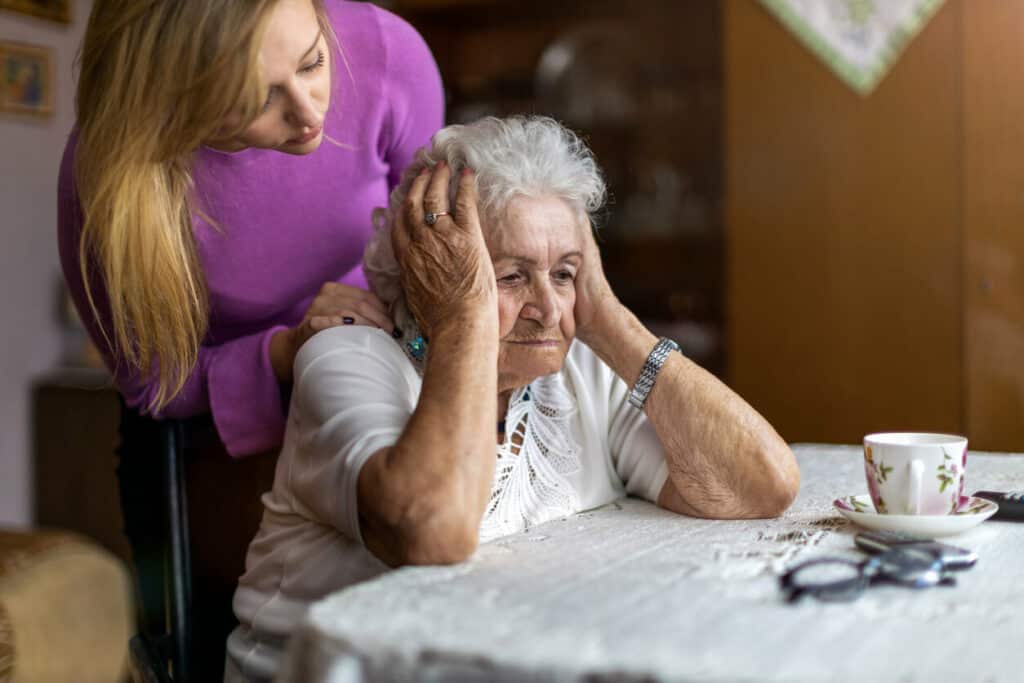
You might also notice some personality changes. For instance, if your loved one is social and outgoing, they may become shy, reserved, and withdrawn from social activities.
The tendency to get easily distracted and lose concentration may be more likely.
Visual perceptual difficulties
This differs from visual hallucinations (of people and animals). If your loved one is experiencing this symptom, they may find it challenging to judge the distance when using the stairs or when driving. This can lead to falls or accidents.
Having one or more of these symptoms doesn’t mean your loved one has early-stage dementia. Once in a while, we forget things, lose concentration, or have difficulty with daily tasks.
You need to seek professional help when you consistently notice these signs in your loved one so your doctor can make a proper diagnosis.
Once early-stage dementia is confirmed, you can begin planning for long-term care. Having a dementia caregiver to help your loved one and provide assistance when necessary can go a long way in preserving their independence.
At Amy’s Eden, we train our caregivers on how to help Alzheimer’s patients and ensure they continue to live independently for as long as possible.
Practical Tips and Coping Strategies for Seniors with Early Dementia and Their Families
Dementia comes with a myriad of challenges. It can be difficult when you don’t know where to start. The following tips and coping strategies for dementia can help everyone involved.
Accept the diagnosis
When your family receives a positive diagnosis, everyone may feel a range of emotions, including fear, anger, frustration, guilt, or denial. Your loved one may insist they are okay or cope with the news by withdrawing or being aggressive.
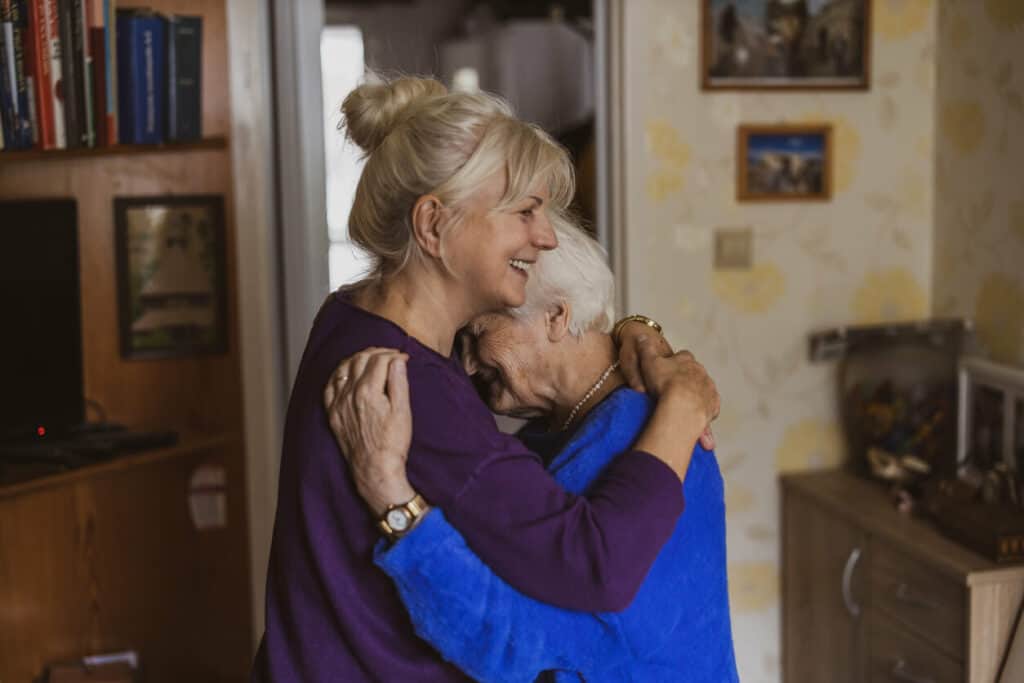
It’s okay to experience these emotions. However, everyone must try to come to terms with the diagnosis. Consider these tips if your loved one is having difficulty accepting the diagnosis.
- Give them as much time as they need to process the emotions they’re experiencing — sadness, anger, or frustration.
- Reassure them that their roles and responsibilities do not change (e.g., being a father, husband, wife, or grandparent).
- Encourage them to talk about the diagnosis with a trusted friend or spiritual leader.
Tips for everyday care
Forgetfulness can happen more often, and your loved one may find it difficult to concentrate or reason properly. It might affect everyday tasks and activities.
But at the early stage, they are mostly self-sufficient. So focus on what they can do and find challenging to do and only provide assistance when it’s necessary. Do things with them rather than taking over everything and treating them as disabled. It will help them feel secure and independent.
Tips and strategies for everyday care include:
- Keep a daily routine for bathing, grooming, eating, or medical reminders. It’s best to do this when your loved one is most alert.
- Set a sleep and wake routine. This may help ease the behavioral symptoms, such as confusion, memory loss, anger, and sundowning.
- Help them plan to-dos, appointments, and events by writing them down in a notebook or calendar.
- Plan and encourage them to take part in indoor activities they enjoy.
- Serve meals in a familiar place; don’t overwhelm them with various food selections, and reduce distractions, like TV, during mealtimes.
- Switch to loose-fitting, comfortable, and easy-to-use clothing.
- Don’t argue when they are trying to be difficult or want to do things themselves.
- Allow them to be independent as much as possible with bathing, eating, and grooming tasks.
- Be gentle and respectful. Always provide reassurance.
Communication tips
Communication is a challenging aspect of dementia care. Improving your communication skills help make caregiving less stressful, especially when your loved one is confused, disoriented, or exhibiting aggressive behavior.
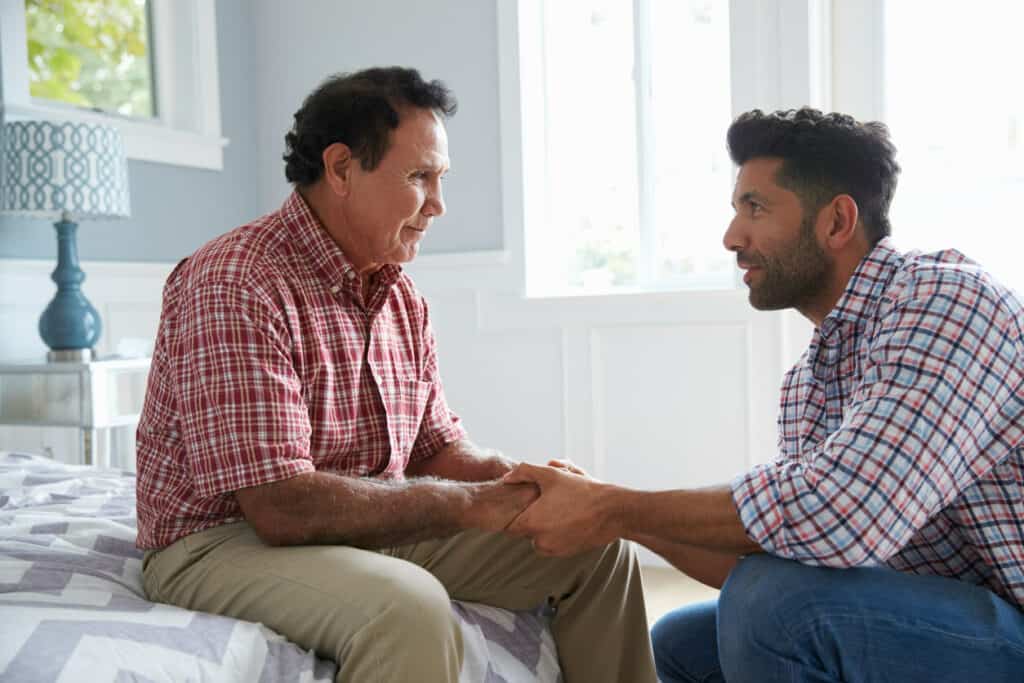
The following tips are useful.
- Always set a positive mood for interaction. Your body language must match your words. Speak or make requests respectfully and use facial expressions, touch, and a gentle tone to convey feelings of affection.
- Limit distractions when you talk to your loved one to ensure you have their full attention. Turn off the TV or radio and take them to a quiet space.
- State your message clearly and speak slowly. Avoid raising your voice when talking, and use short sentences.
- Listen when they talk and give them full attention even when what they say makes little sense.
- Distract when necessary and redirect the conversation by changing the subject or environment when you notice they are getting agitated. You can say, “Can we get something to eat?” or “What about we take a walk?”
- Always respond with care and affection. Smile, hold hands, hug, and praise them.
- Throw in humor as much as possible, but not at their expense. For instance, if your loved one didn’t set the dining table properly, you could gently tease by saying, “Oh, it seems our table has become a work of abstract art today. Picasso would be proud!”.
Make use of memory aids
Since forgetfulness is a prevalent symptom in early-stage dementia, memory aids can remind your loved one of important tasks, activities, or events.
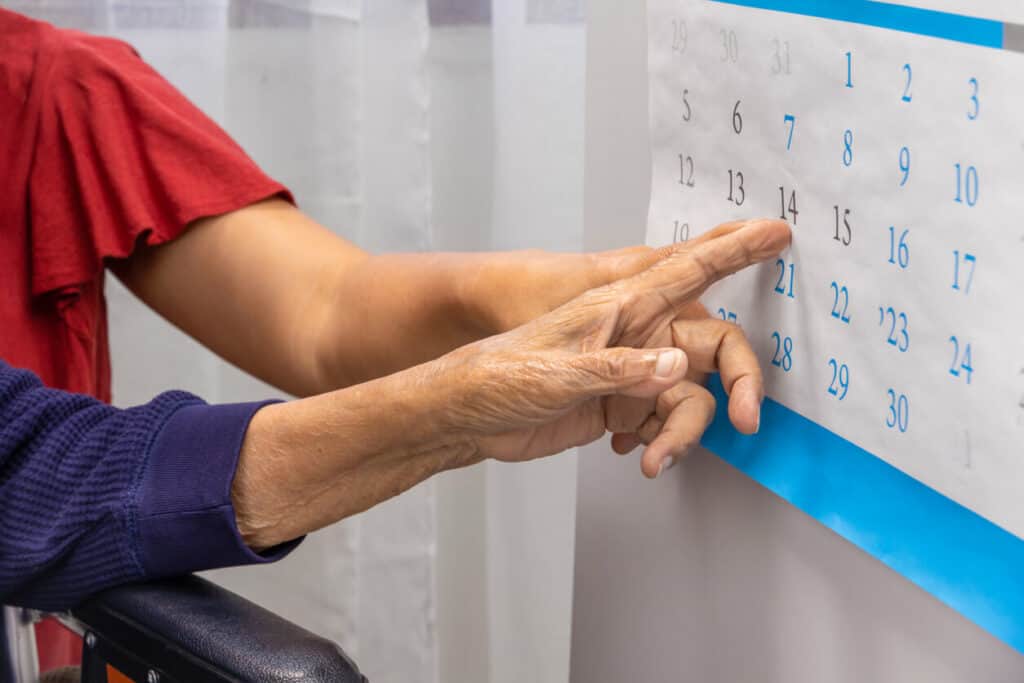
Common memory aids include:
- A calendar or diary to note things down. Be sure to place this where they can see it frequently.
- An automatic calendar clock to tell the time and date
- A shopping list for when they go shopping.
- A list of contact numbers they can quickly call when they need help, stored either in their journal or mobile phone.
- A medication reminder box to remind them if they’ve missed or have taken their meds on time.
- Color codes for easily identifying items. For instance, red for car keys and green for house keys.
- Electronic and smart devices such as Amazon Echo or Google Home
- Prompt and reminder devices to help them remember to lock the door or check that they have switched the kitchen appliances off.
For complex memory aids, an occupational therapist can help set them up and teach your loved one how to use them.
Tips for handling disorientation or confusion
While severe disorientation or confusion is not common in early-stage dementia, your loved one might have instances when they appear confused, agitated, and upset. They may pace around, experience difficulty sleeping, and believe they see things that aren’t there.
They may also get more disoriented as dusk approaches. You can help by:
- Limiting nap time during the day
- Involving them in physical activity or exercise as part of their daily routine
- Not giving them caffeinated beverages, like cola, in the evening
- Establishing a routine of waking up, eating, and sleeping
- Helping identify what triggers disorientation and avoid them
- Avoiding overstimulation during the evening, such as watching TV or listening to loud music
- Indulging them in activities that soothe them, like listening to music, taking a walk, or looking at photographs
- Not physically restraining them and reassuring them calmly
We hope these tips can help you care for your loved one with early dementia. If you need assistance, the best choice is to find a caregiver trained in dementia caregiving.
Making the Home Safe for Seniors with Early Dementia
The tendency to forget, misjudge distances, or get confused can put your loved one at risk for falls and accidents.
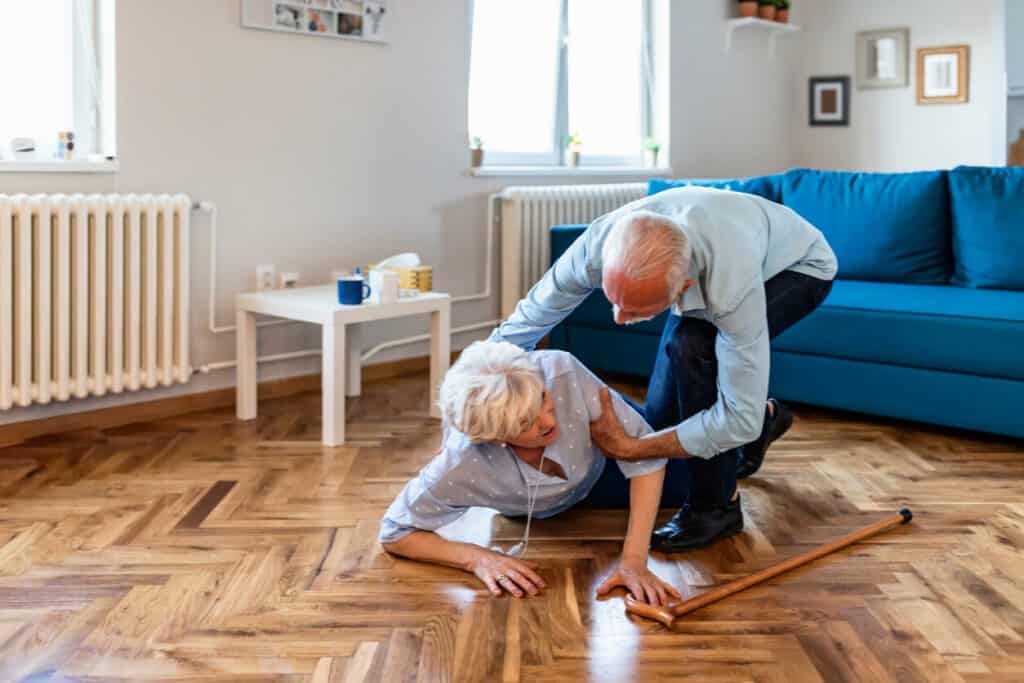
To protect them, ensure the home is safe. You can make changes to keep your loved one safe by removing hazards and modifying certain parts of the home.
Remove hazards from within and outside the home. Threats inside the home can be:
- Scatter rugs and throw rugs
- Extension cords
- Exposed electrical outlets
- Matches, lighters, ashtrays, and cigarettes
- Plastic bags
- Guns and other weapons
Hazards outside the home can include:
- Fallen leaves, branches, ice, and snow
- Uneven surfaces or walkways
- Hose left in the walkway
- Unfenced or uncovered swimming pool
Declutter the home
Get rid of clutter in the home, especially in the kitchen and the bedroom. It makes it easier for your loved one to see what they need. It also prevents unnecessary items that might make up a hazard.
Install Safety Devices
You can install safety devices throughout the home to keep your loved one safe as a preparation for when mild symptoms turn moderate or severe.

- Install smoke alarms and carbon monoxide detectors in the kitchen and bedroom.
- Add secure locks on all outside doors and windows.
- Install alarms that notify you or a dementia caregiver when a door or window is opened.
- Add at least one handrail on staircases. It should extend beyond the first and last steps.
- Mark the edges of the steps with reflective tape.
- Use non-skid wax on hardwood or tiles and tub or shower to prevent falls.
- Keep a night light in rooms your loved one uses regularly.
- Install a safety knob and automatic turn-off device for the stove.
- Install grab bars beside the toilet or use a raised toilet seat.
- Add a monitoring device like a personal emergency response system in the bedroom and toilet to alert you or a senior caregiver if your loved one needs help.
Use contrasting colors but keep patterns minimal
Contrasting colors help people with early to severe dementia see and identify colors. An example is painting the bathroom door a different color from the wall or tiles. Too many patterns on doors can do the opposite. It may make things difficult to see and cause confusion or disorientation.
For more home safety tips, you can check out this checklist from the National Institute on Aging.
While you can reduce the risk of falls and accidents by making the home safe, anything can still happen. We encourage family members to get a professional caregiver to care for and monitor their loved ones.
Amy’s Eden caregivers are trained for memory care and can provide personalized care for your loved one in their home or our assisted home.
Activities to Promote Engagement and Reduce Stress for Seniors with Early Dementia
Staying active and engaged is crucial for dementia patients. Activities that encourage them to move and participate in a social setting can be helpful for your loved one to:
- Stay in good physical health
- Improve cognitive function
- Boost happy hormones
- Slow down the progression of the disease
Choose activities they will enjoy and find the right time to do them, preferably when they’re calm and not anxious or preoccupied.
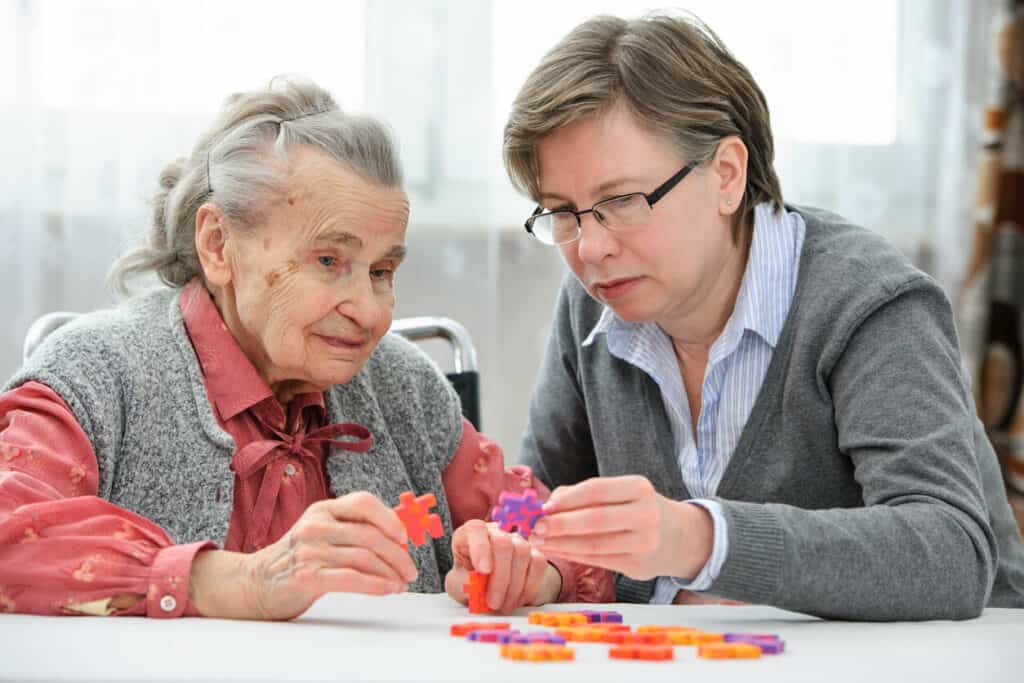
Here are a few activity ideas to get started.
- Games such as board games, trivia knowledge, crossword, matching card, and puzzles
- Telling a joke
- Planting flowers
- Chair exercises
- Tai Chi
- Feeding birds
- Going to the park
- Creating a playlist of their favorite songs
- Trying coloring
- Arts and crafts
- Creating a memory box
- Watching a favorite movie
- Taking them on a spa day
- Baking cookies or bread
There’s a lot you can do to keep your loved one active and healthy. But if you’re busy or live miles away, an elderly caregiver can provide companionship care and social support for your beloved senior.
The Role of Senior Caregivers in the Care of Those with Early Dementia
Family caregivers, also called invisible second patients, may be motivated to care for their loved ones with dementia for various reasons. However, because they are mostly inexperienced and not medically trained for that role, they might find dementia caregiving overwhelming and taxing.
This can lead to caregiver burnout or a state of combined mental, emotional, and physical exhaustion.
Senior caregivers understand better how to help a person with dementia. They are trained to handle symptoms of dementia, including problematic behaviors that family members find challenging to deal with.
They can:
- Provide personalized care effectively
- Easily identify triggers that cause disorientation or other behaviors
- Prevent wandering
- Offer suggestions on home safety to prevent accidents
- Engage seniors with dementia through games and brain-stimulating exercises
Accepting External Help to Your Loved One with Dementia Thrive
You don’t have to struggle to care for your loved one with early dementia alone. Amy’s Eden can provide the support services you need, so your elderly loved one can continue to age independently and enjoy their golden years.
Our caregivers are equipped to provide quality care for people with early cognitive impairment. Whether you need someone to keep your loved one company or offer help with daily tasks, we can create a care plan that meets their family’s needs.
We can provide support in your loved one’s home or one of our luxury assisted homes that only accept two residents per home.
If your loved one lives in Northern Nevada, contact us today to see how we can partner to help your beloved senior with dementia thrive and live a joyful life.




